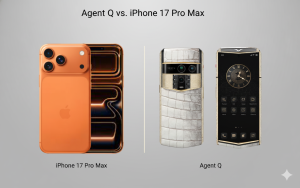Key Takeaways
- Apple dominates the UK smartphone market with 45.19% market share as of August 2025
- Samsung holds second position with 33.25% market share, creating a two-horse race
- Google ranks third with 7.79% market share, followed by Motorola at 3.25%
- iPhone users in the UK significantly outnumber Android competitors when considering individual brands
- Premium features and ecosystem integration drive brand loyalty in the competitive UK market
Apple: The Undisputed Market Leader in the UK
Apple maintains its position as the most popular phone brand in the UK, capturing nearly half of the smartphone market. Apple leads the mobile device market in the United Kingdom, holding over 50 percent of the market share in 2023, with this dominance continuing into 2025.
The iPhone's success in the UK stems from several factors:
Premium Brand Positioning: Apple's reputation for quality and innovation resonates strongly with UK consumers who value long-term device reliability and regular software updates.
Ecosystem Integration: The seamless connectivity between iPhones, MacBooks, iPads, and other Apple devices appeals to professionals and tech-savvy users across the UK.
Strong Retail Presence: Apple's flagship stores in major UK cities like London, Manchester, and Edinburgh provide exceptional customer service and support.
Samsung: The Strongest Android Competitor
Samsung secures its position as the second most popular phone brand in the UK, representing the strongest challenge to Apple's dominance. The South Korean manufacturer's success comes from offering diverse smartphone options across multiple price points.
Galaxy Series Innovation: Samsung's flagship Galaxy S and Note series compete directly with premium iPhones, offering features like superior camera zoom capabilities and S Pen functionality.
Foldable Technology Leadership: Samsung's Galaxy Z Fold and Z Flip series have captured early adopters interested in cutting-edge foldable technology.
Competitive Pricing: Samsung's A-series provides affordable alternatives to premium smartphones, attracting budget-conscious UK consumers.
Google and Motorola: Emerging Players in the UK Market
Google has established itself as the third most popular smartphone brand in the UK with its Pixel series, while Motorola maintains a respectable fourth position. These brands appeal to specific user segments seeking pure Android experiences or value-oriented devices.
Google Pixel Appeal: The Pixel series attracts photography enthusiasts and users who prefer stock Android without manufacturer customizations.
Motorola's Heritage: As a historic mobile phone brand, Motorola appeals to users seeking reliable, affordable smartphones with near-stock Android experiences.
Why Brand Popularity Matters When Choosing Your Next Phone
Understanding phone brand popularity in the UK helps consumers make informed decisions about their smartphone purchases. Popular brands typically offer several advantages:
Better Resale Value: Popular phone brands like Apple and Samsung maintain higher resale values, protecting your investment when upgrading.
Wider Accessory Selection: Popular brands enjoy broader accessory ecosystems, from cases and screen protectors to wireless chargers and stands.
Enhanced Support Network: Popular brands maintain extensive service networks across the UK, ensuring easier repairs and customer support.
Software Longevity: Leading brands typically provide longer software support periods, keeping your device secure and up-to-date for years.
Market Trends Shaping UK Phone Brand Preferences
Several key trends influence which phone brands gain popularity in the UK market:
5G Network Expansion: The UK government has been investing significantly in 5G infrastructure, aiming to cover 99% of the population with high-speed mobile networks by 2027, driving demand for 5G-capable devices from leading brands.
AI Integration: Advanced AI features in cameras, voice assistants, and productivity apps increasingly influence brand choice among UK consumers.
Sustainability Concerns: Environmental consciousness affects purchasing decisions, with brands offering device recycling programs and sustainable manufacturing practices gaining favor.
Work-from-Home Requirements: The shift to remote work has increased demand for smartphones with excellent cameras, productivity features, and seamless laptop integration.
UK Phone Brand Market Share Comparison
| Brand | Market Share (2025) | Key Strengths | Target Audience |
|---|---|---|---|
| Apple | 45.19% | Premium ecosystem, regular updates, strong resale value | Professional users, students, brand loyalists |
| Samsung | 33.25% | Diverse product range, innovation leadership, competitive pricing | Tech enthusiasts, business users, budget-conscious buyers |
| 7.79% | Pure Android experience, superior AI features, excellent cameras | Photography enthusiasts, tech purists, early adopters | |
| Motorola | 3.25% | Affordable pricing, reliable performance, near-stock Android | Budget-conscious users, first-time smartphone buyers |
Choosing the Right Phone Brand for Your Needs
When selecting a phone brand in the UK market, consider these scenario-based recommendations:
For Business Professionals: Apple iPhones excel in corporate environments with superior integration with productivity software and enhanced security features.
For Photography Enthusiasts: Google Pixel devices offer computational photography advantages, while Samsung Galaxy S series provides versatile camera systems.
For Budget-Conscious Buyers: Samsung's A-series and Motorola's mid-range offerings provide excellent value without compromising essential features.
For Tech Early Adopters: Samsung's foldable phones and latest Galaxy S series offer cutting-edge features and innovative designs.
Regional Preferences Within the UK
Phone brand popularity varies across different regions of the UK:
London and Southeast: Higher Apple market penetration due to affluent demographics and business concentration.
Northern England and Scotland: More balanced distribution between Apple and Samsung, with price-conscious consumers favoring diverse Android options.
Wales and Southwest: Growing preference for value-oriented brands like Motorola and budget Samsung models.
Future Outlook: UK Phone Brand Market Evolution
The UK smartphone market continues evolving with several factors influencing future brand popularity:
Emerging Chinese Brands: While currently limited, brands like Xiaomi and OnePlus may gain traction among value-seeking consumers.
Foldable Technology Adoption: Samsung's early leadership in foldables may strengthen its position against Apple.
5G Feature Parity: As 5G becomes standard, differentiation will shift to AI capabilities, camera innovations, and battery performance.
FAQ: UK Phone Brand Popularity
Q: Is iPhone really more popular than Samsung in the UK?
A: Yes, Apple holds a significantly larger market share at 45.19% compared to Samsung's 33.25% in the UK market as of 2025.
Q: Why is Apple so popular in the UK compared to other European countries?
A: Apple's popularity in the UK stems from higher disposable income, strong brand loyalty, extensive retail presence, and cultural preference for premium technology products.
Q: Which phone brand offers the best value for money in the UK?
A: Samsung's A-series and Motorola devices typically offer the best value proposition, combining essential features with competitive pricing for UK consumers.
Q: Are Chinese phone brands popular in the UK?
A: Chinese brands like Xiaomi have limited but growing presence in the UK, primarily among tech-savvy users seeking flagship features at lower prices.
Q: How often do UK consumers change phone brands?
A: UK consumers show relatively high brand loyalty, with approximately 70% staying within the same brand ecosystem when upgrading their smartphones.
Q: Which phone brand has the best customer service in the UK?
A: Apple consistently ranks highest for customer service in the UK due to its Genius Bar support system and extensive retail network across major cities.
Recommended Target Audiences
iPhone Enthusiasts: Professionals, students, and users valuing premium build quality, regular software updates, and seamless ecosystem integration.
Android Power Users: Tech enthusiasts seeking customization options, diverse hardware choices, and cutting-edge features from Samsung and Google.
Budget-Conscious Buyers: First-time smartphone users, students, and value-seeking consumers interested in Motorola and Samsung's affordable ranges.
Business Users: Corporate professionals requiring enhanced security, productivity features, and reliable performance from established brands like Apple and Samsung.
The UK smartphone market's brand preferences reflect consumers' priorities for quality, innovation, and value. While Apple maintains clear leadership, Samsung's strong second position and emerging competitors ensure a dynamic, competitive landscape that benefits UK consumers through continuous innovation and competitive pricing.









